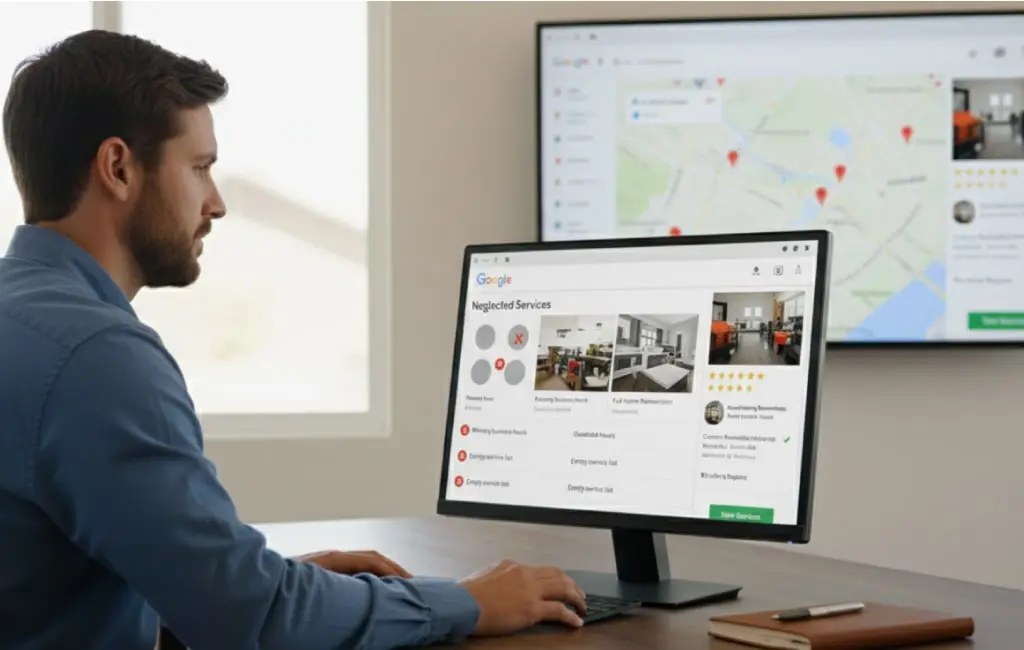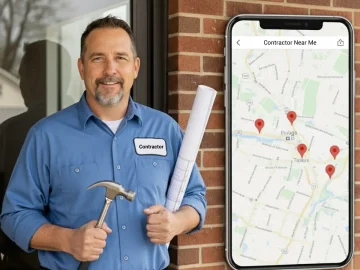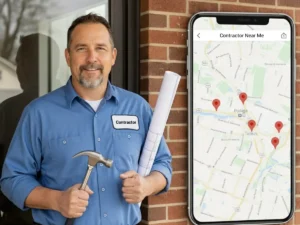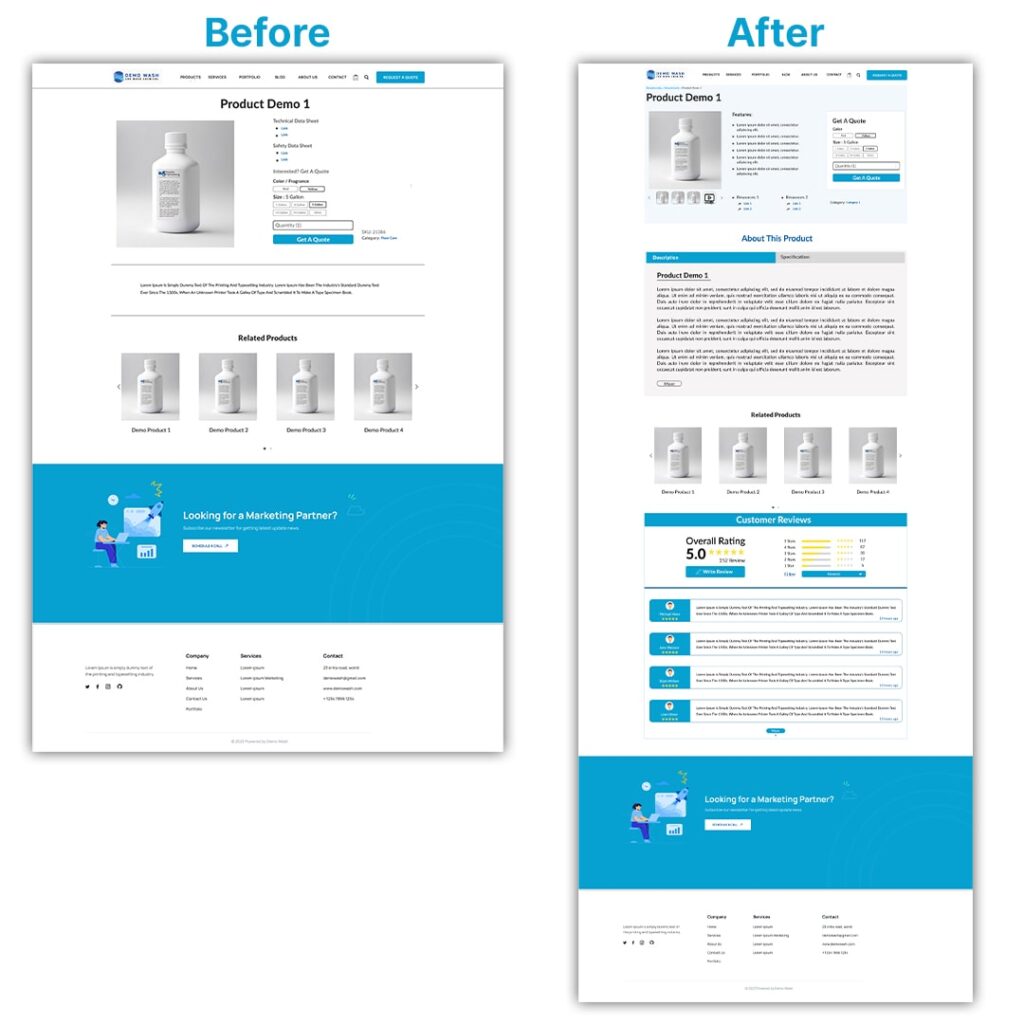Your next customer is probably just a few blocks away, but will they find you when they search online? These days, homeowners and businesses don’t flip through the Yellow Pages or wait for referrals; instead, they turn to Google and type in “contractor near me.”
So, if your business isn’t showing up, that lead (and the job that comes with it) is going straight to a competitor. That’s where local SEO for contractors makes all the difference!
In other words, local SEO ensures your business shows up front and center when potential clients in your area are actively searching for your services.
From optimizing your Google Business Profile to gathering customer reviews, these steps help you not only get found but also build trust and win more jobs. Want to know more? Let’s get started!
What is Local SEO for Contractors?
Local SEO for contractors is basically the strategy of making your business more visible online to people searching in your service area. Instead of competing nationally, you focus on local search optimization so your business appears in local search rankings and shows up in the Google Maps SEO results when potential clients type in things like “roofing contractor near me” or “electrician in [your city].”
The goal is simple: be seen by the right people at the right time. When you rank higher locally, customers are more likely to call you because you look trustworthy and nearby.
For example, let’s say someone needs emergency plumbing. They pull out their phone and search for “plumber near me.” If your business has strong local SEO, your name pops up in the top results on Google Maps, giving you a big advantage over competitors who don’t show up.
And for contractors, that means more phone calls, more job requests, and more steady business from the community.
Why Local SEO Matters for Contractors?
Nowadays, most homeowners and businesses won’t even flip through a phone book or wait for a referral; they will simply Google what they need. That’s why the importance of local SEO can’t be overstated!
Hence, let’s take a look at the major reasons why local SEO for contractors is essential:
Boost Online Visibility for Contractors
Local SEO ensures your business ranks higher in local search rankings and appears in the “map pack” on Google. This visibility puts you right where potential clients are looking, so you don’t miss out on valuable leads.
Attract Local Clients Who Are Ready to Hire
Unlike traditional advertising, local SEO for contractors targets people in your service area who are already searching for your services. These leads are warmer, more qualified, and more likely to convert into paying clients.
Stay Ahead of Competitors
In terms of contracting, the competition is extremely fierce. Many businesses rely only on word-of-mouth or outdated listings.
Therefore, by investing in local search optimization, you can show up first and stand out as the go-to contractor in your area.
Build Trust and Authority Online
Appearing on Google Maps with positive reviews instantly boosts credibility. Customers often equate higher rankings and more reviews with greater reliability, making them more likely to choose you over someone less visible.
Drive Consistent and Long-Term Leads
Local SEO is an ongoing system that basically works 24/7. Meaning, once your online presence is optimized, it keeps generating traffic, calls, and inquiries around the clock, building a steady pipeline of work.
Increase ROI on Marketing
Compared to expensive traditional ads or broad campaigns, local SEO is highly cost-effective. You are reaching the exact people who are most likely to hire you, maximizing your return on investment.
Strengthen Your Local Brand
The more your business shows up in local searches, the more familiar it becomes to your community. Meaning, even if customers don’t hire you right away, repeated visibility builds recognition and trust over time.
Benefits of Local SEO for Contractors
When you optimize your presence for local searches, you do more than just improve search rankings. Any guesses?
Well, you attract the right customers at the right time, build trust, and create a steady flow of local leads, which is indeed the important thing.
Such as the following:

- Improve Search Rankings: Local SEO for contractors helps your business climb higher in Google results and the local “map pack,” making it easier for potential clients to discover you before they ever see your competitors.
- Get Found by Ready-to-Hire Customers: Most people searching for contractors online need services quickly. With strong local SEO, your business shows up at the exact moment they are ready to call or book.
- Boost Credibility and Trust: Appearing at the top of local search results, combined with positive reviews, positions you as the trusted, go-to contractor in your area.
- Increase Website Traffic and Calls: Better visibility leads to more clicks, calls, and quote requests, turning your website and Google Business Profile into 24/7 lead-generating tools.
- Cost-Effective Marketing: Unlike paid ads that disappear as soon as you stop spending, local SEO for contractors provides lasting results. Once optimized, it keeps driving traffic and leads without constant spending.
Difference Between Local SEO and General SEO
Contractors often hear about SEO but aren’t always clear on whether they need to focus locally or more broadly.
At first glance, they may seem similar, but they both involve optimizing your website and content to rank higher on Google. But the goals, strategies, and results are actually very different. Let’s find out:
General (Global) SEO
Global SEO is about reaching a broad audience across cities, states, or even countries. Businesses that sell products nationwide or operate in multiple regions use global SEO to target broad search terms.
For example, a roofing materials manufacturer might optimize for a keyword like “best asphalt shingles.” This doesn’t have a local intent; it attracts visitors from anywhere.
With global SEO, the competition is tougher because you are up against national or international companies. It requires a large content strategy, backlinks from authority sites, and often bigger budgets.
Local SEO
Local SEO, on the other hand, is all about proximity. It’s designed to help contractors and service providers show up when someone nearby searches for their services.
For instance, if a homeowner types “bathroom remodeling contractor in Phoenix”, Google wants to display businesses in that exact location.
Local SEO combines traditional optimization with tactics like:

- Optimizing your Google Business Profile for visibility on Google Maps
- Collecting local reviews to build credibility
- Ensuring on-page SEO for contractors highlights service areas (city names, neighborhoods)
- Building citations on local directories with consistent NAP (Name, Address, Phone number)
Why Does It Matters for Contractors?
For a contractor, ranking globally for a keyword like “roof repair tips” may get clicks, but those visitors won’t turn into paying clients if they live across the country. Local SEO for contractors makes sure your business is visible to people in your city who are ready to hire you today.
In short:
- Global SEO builds awareness on a large scale.
- Local SEO drives real leads and phone calls right in your service area.
If your goal is contractor lead generation, local SEO for contractors will always deliver more direct results than chasing broad global rankings.
10 Steps to Get More Leads with Local SEO for Contractors
Local SEO for contractors is one of the most powerful tools when it comes to attracting nearby clients. After all, it ensures your business is visible at the exact moment local clients are looking for your services. But the truth is, success doesn’t happen by accident, it requires a step-by-step strategy.
Here are 10 practical steps contractors can follow to attract more local leads and stay ahead of the competition:
Step 1 – Audit Your Current Online Presence
Before improving anything, you need to know where you currently stand. First off, start with a website audit for contractors to check your site’s speed, mobile responsiveness, user experience, and how well it’s optimized for search. Is your contact info easy to find? Do your service pages clearly highlight what you offer?
Next, run a Google Business audit. Look at your Google Business Profile, are all details (hours, phone number, address, services) accurate and complete? Is your listing verified? These audits give you a baseline and reveal quick wins you can tackle immediately.
Step 2 – Research Local Keywords
Next up, the foundation of local SEO is knowing what your customers are typing into Google. Next up, conduct local keyword research to identify the exact phrases people in your area use, like “basement waterproofing in Dallas” or “electrician near me.”

Also, prioritize GEO targeted keywords that include your city, county, or neighborhood. These terms bring in highly qualified traffic, people who aren’t just browsing but actively looking for your services nearby.
Step 3 – Optimize Your Website for Local Search
Your website should make it crystal clear to Google (and your customers) where you work and what you do. Hence, focus on local content optimization by including city names and service areas in your content naturally.
Use on-page SEO for contractors best practices:
- Add target keywords in title tags, meta descriptions, and headers.
- Embed Google Maps on your contact page.
- Include your NAP (Name, Address, Phone number) consistently across all pages.
This helps search engines understand your relevance to local searches and makes your site more appealing to visitors.
Step 4 – Set Up and Optimize Google Business Profile
Your Google Business listing is often the first impression people get of your company. Claim it, verify it, and fully optimize it:
- Add high-quality photos of your work and team.
- List all services you provide.
- Post regular updates or offers.
Optimizing your profile improves Google Maps visibility, making you more likely to appear in the “local 3-pack” (the top three results shown on Maps), a spot that drives the majority of calls and clicks.
Step 5 – Build and Maintain Local Citations
Local business citations are mentions of your business on directories, review sites, and industry platforms like Yelp, Angie’s List, Houzz, or HomeAdvisor.
Hence, make sure your NAP consistency is 100% correct everywhere.
Otherwise, if your phone number or address differs from one site to another, Google will get confused, and, in the worst case scenario, your rankings may drop.
Accurate citations build trust with search engines and increase your chances of appearing higher in local results.
Step 6 – Create Location-Specific Landing Pages
If you serve multiple cities or neighborhoods, don’t just rely on one generic service page. Instead, create location-specific landing pages for each area. For example:
- “Kitchen Remodeling in Chicago”
- “Roof Repair in Naperville”

These pages should include unique content that speaks directly to that location (local landmarks, community references, client testimonials).
So, you can get a better rank in more areas along with making your site feel more personal and relevant.
Step 7 – Implement Internal and External Link-Building
Links are like digital referrals. Start with a solid internal linking strategy by connecting your blog posts, service pages, and location pages together. This helps users navigate easily and signals to Google which pages are most important.
Then focus on earning external backlinks. Partner with local blogs, chambers of commerce, or community websites. Even sponsoring a local event or charity can lead to valuable backlinks that boost your authority and visibility.
Step 8 – Collect and Use Customer Reviews
Reviews are the lifeblood of online reputation management. Encourage satisfied clients to leave feedback on Google, Yelp, or Facebook. Develop a review generation strategy, for example, follow up with clients after a project and send them a direct link to your review page.
Showcase client testimonials on your website and social media. The more positive reviews you collect, the more credibility you build and since reviews influence search rankings, they directly improve your visibility too.
Step 9 – Optimize for Voice Search and AI Features
With the rise of smart speakers and AI-driven search, voice search SEO is more important than ever. People speak differently than they type, for example, instead of typing “plumber Dallas,” they might ask, “Who’s the best plumber near me right now?”
To capture these leads, optimize your content with conversational phrases and FAQs. Provide short, direct answers to common customer questions, this increases your overall chances of being chosen as the featured result.
Step 10 – Monitor, Track, and Improve Your Local SEO
Finally, treat SEO as an ongoing process. You can use SEO reporting tools like Google Analytics and Google Search Console to monitor website traffic, search rankings, and calls from your Google Business Profile.
Regularly review your progress: Which keywords are driving the most leads? Which service areas need more attention? In this way, by tracking results and making necessary adjustments, you will be able to stay ahead of competitors and keep improving over time.
How Long Does Local SEO Take for Contractors?
One of the most common questions contractors typically ask is: “How long will it take before I start seeing results from local SEO?”
The honest answer is it totally depends!

However, on average, most contractors start noticing small improvements in search rankings and traffic within 2–3 months. But real, measurable results, like consistently appearing in the Google Maps 3-pack or generating steady calls, often take around 6–9 months of consistent effort.
What Affects the Timeline?
Well, several factors influence how quickly you will see results:
- Competition in your area – If you are in a big city with lots of contractors, it may take longer to climb the rankings compared to a smaller town.
- Your starting point – Contractors with no website or poorly optimized profiles will need more time than those who already have some online presence.
- Consistency of effort – Regularly updating your Google Business Profile, collecting reviews, creating content, and building citations accelerates progress.
- Quality of optimization – A well-optimized website with proper on-page SEO for contractors, strong local content, and NAP consistency will always rank faster.
Why Patience Pays Off?
The great thing about local SEO for contractors is that once the foundation is in place, it keeps working for you 24/7, long after you have put in the initial effort. Unlike ads that disappear the moment you stop paying, local SEO builds momentum that compounds over time, making it one of the smartest long-term marketing investments for contractors.
In short: You can expect some early wins in a few months, but better to give it 6–9 months for significant results. The effort you put in today will keep delivering local leads for years to come.
Common Mistakes to Avoid in Local SEO for Contractors
Local SEO for contractors can be a game-changer, but only if it’s done right.
The truth is, many businesses waste time and effort by making simple mistakes that keep them from ranking well or attracting quality leads.
The good news? Once you know what to look out for, these errors are easy to fix. Below is a list of some of the most common mistakes local SEO for contractors should avoid:
Inconsistent Business Information (NAP Errors)
Your Name, Address, and Phone number (NAP) must be 100% consistent everywhere online, from your website to your Google Business Profile to local directories.
Even a small variation, like using “Street” in one place and “St.” in another, can confuse search engines. This inconsistency makes Google less confident about your business, which can push you down in the rankings.
How to avoid it: Audit your citations regularly and correct any mismatched info. Use one exact format for your NAP across all platforms.
Neglecting Your Google Business Profile
Your Google Business listing is often the first thing customers see. A half-complete profile with missing photos, no services listed, or outdated hours sends the wrong message. Worse, it reduces your chances of showing up in the coveted Google Maps “3-pack.”
How to avoid it: Fill out every section, upload high-quality photos of your work, add detailed service descriptions, and post updates regularly to stay active.

Not Targeting Local Keywords
Using only broad terms like “roofing contractor” won’t help you much in local search. Without GEO-targeted keywords (e.g., “roofing contractor in Houston”), your website may compete against national companies instead of focusing on the clients in your area who are ready to hire.
How to avoid it: Research and use city-specific keywords in your titles, headings, and service pages. For example, you can think about how real customers in your town would search for you.
Thin or Duplicate Content
Contractors sometimes copy-paste the same content across multiple location pages. Google sees this as duplicate content, which lowers your ranking potential. Thin, generic service descriptions also fail to engage potential clients.
How to avoid it: Write unique content for each location or service page. Highlight local landmarks, neighborhoods, or even customer stories to make each page authentic and relevant.
Ignoring Reviews and Reputation Management
Reviews aren’t just nice to have, they are a major ranking factor. Ignoring review requests or leaving negative reviews unanswered hurts both your search performance and your credibility.
Reviews aren’t just nice to have, they are a major ranking factor. Ignoring review requests or leaving negative reviews unanswered hurts both your search performance and your credibility.
How to avoid it: Build a review generation strategy. Also, make sure to ask happy clients to leave feedback, and always respond, whether reviews are positive or negative. Engaging with reviews shows professionalism and builds trust.
Build a review generation strategy. Also, make sure to ask happy clients to leave feedback, and always respond, whether reviews are positive or negative. Engaging with reviews shows professionalism and builds trust.
Overlooking Mobile Optimization
Most local searches happen on mobile devices. If your site is slow, cluttered, or hard to use on a phone, visitors will leave immediately. Google tracks this behavior, which can hurt your rankings.
How to avoid it: Test your site on different devices. Make sure pages load quickly, buttons are easy to click, and contact options (like “Call Now” buttons) are front and center.
Treating SEO as a One-Time Task
A common mistake contractors make is thinking, “I set up my site and profile, so I’m done.” But local SEO for contractors is an ongoing process. Rankings can slip, competitors can out-optimize you, and search algorithms evolve.
How to avoid it: Use tools like Google Analytics or Google Search Console to track performance. Update your content regularly, add new photos, and adjust strategies based on what’s working.
Concluding Words
The competition for local leads is tough, but with the right SEO strategy, you can indeed put your business ahead of the pack.
So, make sure to start small and stay consistent, and you will soon notice the difference: more clicks, more calls, and more projects lined up.
After all, with a strong local SEO strategy, your contracting business won’t just compete; it will dominate in your service area!








